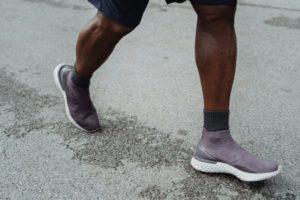 Are you struggling to get the rest you need because of your sleep apnea? Even if you have an effective treatment in place, like an oral appliance, dozing off isn’t easy for everyone. It may not be from a bad mattress. Instead, the solution can be as simple as taking a walk. Research has found that regular exercise can lead to better sleep and reduce symptoms of sleep apnea.
Are you struggling to get the rest you need because of your sleep apnea? Even if you have an effective treatment in place, like an oral appliance, dozing off isn’t easy for everyone. It may not be from a bad mattress. Instead, the solution can be as simple as taking a walk. Research has found that regular exercise can lead to better sleep and reduce symptoms of sleep apnea.
What is Sleep Apnea?
The most common type of sleep apnea is caused by an obstruction in the airway created by the soft tissues or tongue collapsing. It can cause frequent breathing disruptions while sleeping. Each drop in oxygen causes your brain to jolt you awake to resume regular breathing. Although you may not be aware of the brief awakenings, they will interrupt your sleep cycle. Over time, you can experience mood changes, daily fatigue, memory loss, and sleep deprivation.
Unfortunately, the complications don’t end there. Each time you stop breathing, it depletes your body of oxygen, straining every system. Eventually, you can develop life-threatening health problems, like heart disease. Anyone can have obstructive sleep apnea, but there are many risk factors, like obesity and diabetes.
Link Between Exercise and Sleep Apnea
According to 3 new studies, people who are physically active sleep better than those who aren’t. Researchers have found that weight training or brisk walking can improve the severity of sleep apnea by 25%. Surprisingly, the benefit was achieved without any weight reduction.
Regular exercise is also a natural way to control blood pressure. With sleep apnea being linked to several cardiovascular issues, including high blood pressure and heart attacks, taking a quick daily walk can also help you maintain a healthy weight. The combination of exercise and weight loss can significantly reduce sleep apnea symptoms.
Not only will you achieve better health, but you’ll also improve your sleep quality. A study involving 43 inactive adults with sleep apnea found that 30 to 40 minutes of brisk walking 4 times per week improved their sleep quality. They also reported an improvement in their mood and overall daytime functioning.
Breathe Better and Sleep Soundly
Although exercise can help you manage sleep apnea, it isn’t a substitute for treatment. Your dentist can provide you with the solution you need to breathe better, like a CPAP. A steady stream of air pressure is delivered through a mask worn over the mouth or nose to prevent breathing disruptions.
As an alternative to a CPAP, you might be a candidate for oral appliance therapy. A customized device repositions your tongue and jaw in more comfortable positions to keep the airway open. A good night’s sleep is possible with the right treatment and a little exercise.
About Dr. Jay A. Nelson
Dr. Nelson earned his dental degree from the University of Pennsylvania and has regularly continued his education to focus on sleep medicine. He is a member of many professional organizations, including the American Board of Dental Sleep Medicine. Request an appointment through our website or call (813) 694-1580 for an appointment.
